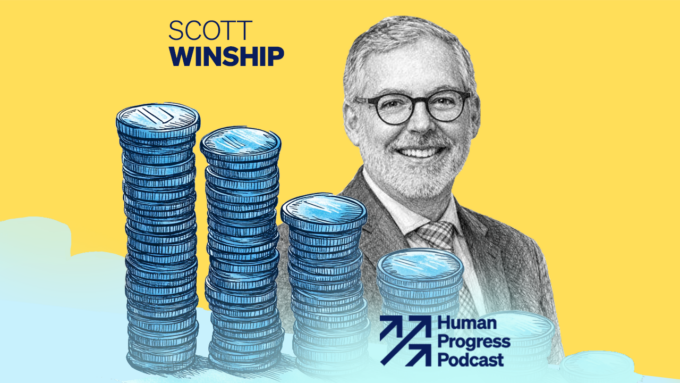Two weeks ago, I wrote about growing prosperity on the African continent. I noted that African economies are, by and large, rapidly growing. As such, indicators of human well-being, including infant mortality, life expectancy and nutrition, have been improving. Regrettably, there has been no substantial improvement in the quality of Africa’s institutions. The quality of the rule of law and levels of corruption are strikingly similar to what they were in 2000. Similarly, political and civil freedoms, and freedom of the press, have not noticeably improved. Most of Africa’s remaining developmental challenges are caused by domestic factors that require domestic solutions. But, there are a few areas, where US action could benefit both Africans and Americans. Below I look at free trade, agricultural subsidies, aid and smart sanctions.
Free Trade
The United States can help Africa by further opening its markets to African exports. The US Congress took a step in the right direction, by adopting the Africa Growth and Opportunity Act in 2000. In 2015, AGOA was extended until 2025. Today, 39 African countries remain eligible to export to the United States under the terms of AGOA. In 2013, about 91 percent of US imports from AGOA countries entered the United States duty-free.
Combined two-way trade between the United States and AGOA countries doubled between 2001 and 2014, with a peak recorded in 2008 and valued at almost $100 billion. The global financial crisis and declining US reliance on foreign oil have reduced the total amount of trade between the United States and AGOA countries to roughly $50 billion per year, with Africa’s trade surplus amounting to some $2 billion.
The benefits of free trade are political as well as economic. First, free trade can be a potent weapon against terror directed against the United States. Apparel trade with the United States alone has created tens of thousands of jobs in the AGOA countries. By providing opportunities, such increased economic connections between the world’s trouble spots and the United States may help deter potential terrorist sympathizers.
Second, trade increases specialization. Increased specialization leads to increasing productivity. Reductions in the cost of production lead to cheaper goods and services, which, in turn, increase the standard of living for Americans and Africans alike.
Unfortunately, Washington limits the economic benefits of AGOA in two specific ways. First, some quotas predate AGOA and were not amended by AGOA legislation. Second, AGOA excludes some agricultural products from duty free access, including sugar, tobacco, dairy, beef and processed agricultural goods such as dried garlic, canned peaches and apricot.
While opening US markets to African goods can help the continent, such a move is not sufficient to bring it out of poverty. Tariffs seen in Africa are among the highest in the world. According to the World Bank, the average applied tariff on imports to African countries is over 10 percent. In contrast, the average tariff applied by emerging economies like Chile, Vietnam, and Taiwan is less than 6 percent. In order to prosper, African countries will have to cut their own external and internal trade barriers, and continue with wide-ranging economic reforms that will enable Africa’s private sector to grow.
Agricultural Subsidies
In addition to making AGOA comprehensive and unconditional, the US government should stop subsidizing the American agricultural sector. The 2014 Farm Bill is expected to cost the US taxpayer $956 billion between 2014 and 2023. If history is anything to go by, the cost of farm subsidies will rise. The 2002 Farm Bill, for example, cost 30 percent more than the expected $451 billion. The 2008 Farm Bill cost the taxpayer 42 percent more than the projected $641 billion.
Ending US farm subsidies would make some agricultural products exported by African countries more competitive, raising farm incomes and reducing poverty in Africa. According to Oxfam International, for example, some 10 million people in Central and Western Africa who rely on the production and sale of cotton lose up to $250 million a year due to Western subsidies. Agricultural subsidies are a waste of taxpayer dollars and morally indefensible vis-à-vis the world’s poor. They should be abolished.
Aid and Debt
British economist Peter Bauer once described foreign aid as ‘‘taxing poor people in rich countries and passing it on to rich people in poor countries.’’ That is an especially accurate description of aid to Africa. Instead of stimulating private sector growth, aid has increased the size of government. It has enabled government officials to embezzle large amounts of money and misspend much on loss-making projects. Crucially, it served as a disincentive to economic and political reforms. Today, most researchers agree that economic growth depends on market-oriented domestic policies, not aid.
Since the 1960s, Africa has seen some of the largest recipients of aid per capita. Yet, the region’s growth rate averaged less than 2 percent per year during the final fifteen years of the last millennium, while averaging close to 5 percent since the start of the new millennium. The difference in the growth rates between then and now is not due to the increased amount of aid, but rather to high commodity prices and domestic reforms.
Considering the negative consequences of aid and the precarious state of American finances, it is surely time to stop transferring financial resources to governments abroad. The sums are not trivial. In 2001, the USAID spent $15 billion on foreign aid globally, with disbursements in Africa amounting to $1.7 billion. In 2014, USAID spent $41 billion globally, with disbursements to Africa amounting to $10 billion. Put differently, in 2001 the USAID spent every 9th dollar in Africa, whereas in 2014, it spent every 4th dollar in Africa.
Should the US government insist on spending some resources on “African” projects, development of human capital might deliver greater dividends than giving money to African governments. More African judges and lawyers, for example, might benefit from observing the workings of an efficient and impartial judiciary in the West. Similarly, African businessmen and women might benefit from easier travel to and work in the United States, thereby learning best business and accounting practices. The US Congress could help build Africa’s human capital by relaxing visa and work requirements for Africans, and even offer scholarships and apprenticeships to qualified applicants.
Aside from bilateral aid, Washington also participates in multilateral aid schemes overseen by a variety of international institutions, including the World Bank, the African Development Bank, and the International Monetary Fund (IMF). Those multilateral institutions have often backed unsavory African regimes that have engaged in human rights abuses and gross macroeconomic mismanagement. And although the World Bank’s structural adjustment programs and IMF lending were designed to provide credit in exchange for reforms in the region, African compliance with lending conditions has been poor or nonexistent.
The World Bank and IMF do not have the ability to enforce compliance with their loan conditions. Yet both agencies keep lending and Africa’s debt continues to accumulate. Under the Heavily Indebted Poor Countries Initiative, close to 30 African countries received some form of debt relief amounting to tens of billions of dollars. As a consequence, Africa’s debt to GDP ratio fell from 66 percent in 2000 to a low of 24 percent in 2008. Since then, the ratio has climbed back up to 36 percent.
Unlike in the past, when African governments borrowed almost exclusively from official creditors, such as the World Bank and the IMF, today Africa owes roughly half of its $250 billion debt to private creditors. This is a step in the right direction, for private lenders tend to be more circumspect when lending money to African countries and more insistent that African governments fulfil their commitments to reform and repayment. The discipline that markets impose on historically irresponsible governments would be much enhanced if official aid to Africa ceased.
Smart Sanctions
The United States has often reached out for some form of sanction in order to punish the perpetrators of gross human rights violations. However, it is important to recognize that few international sanctions have led to policy changes in targeted countries. To the extent that they helped to end apartheid, success of sanctions against South Africa appears to be an exception, not the rule.
There are a number of reasons for the limited effectiveness of sanctions. Global agreement on imposition of sanctions is difficult to reach and even more difficult to maintain. Moreover, as sanctions against Saddam Hussein’s Iraq showed, all too often it is the poor people who suffer, not the ruling elite.
Should the United States feel compelled to target those leaders in Africa who are strongly suspected of corruption and abuses of human rights, it might consider resorting to international arrest warrants, freezing of personal assets abroad, prohibitions on travel, and arms embargos. That said, sobriety is in order, for there is little evidence that such “smart sanctions’’ will bring about change in government policies or make the lives of the ruling elite more difficult.
In spite of “smart sanctions” imposed on him and his cronies by the United States in 2003, Robert Mugabe continues to run Zimbabwe, enjoys shopping and travel overseas, and maintains access to the best international healthcare. At home, he uses “American sanctions” to stoke up anti-Western sentiments and blame the United States and other Western powers for Zimbabwe’s economic problems.The chief responsibility for the quality of government on the African continent rests with the African people, not with the well-meaning Americans.
This article was first published in CapX.





